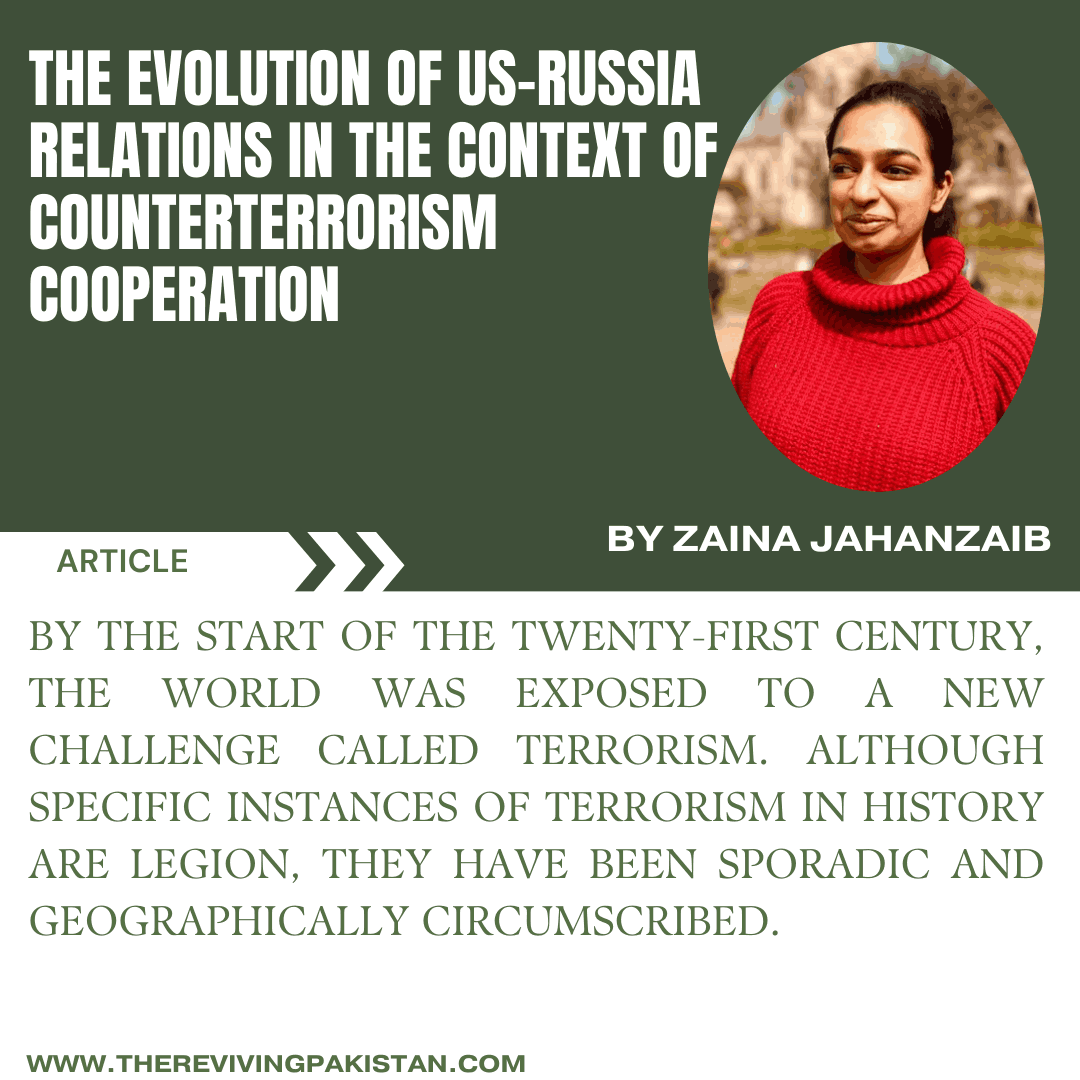About the Author(s)

Zaina Jahanzaib
The author is pursuing a BS in International Relations at GCU Lahore. She believe that writing can be a great tool to make a positive impact on the world as well as to make people aware of the things they otherwise would not know. Author introduce new ideas and issues that should be given more importance.
By the start of the twenty-first century, the world was exposed to a new challenge called terrorism. Although specific instances of terrorism in history are legion, they have been sporadic and geographically circumscribed.
Since the attacks of 9/11, the primary focus of American foreign policy has ostensibly been the “war on terror,” Therefore, they tended to seek cooperation from as many countries as possible. Including the country they had fought against, for almost half a century, [Russia]. the American plan was to enmesh Russia and to make it a democracy as the other Eastern European states. And for a while, the plan seemed to be working. Fighting terrorism was a common interest. And it indeed served as a catalyst for the two powers to grow closer to each other. It was believed and is mentioned by many American officials at that time that the United States was experiencing the best simultaneous relationship with the Chinese and Russians in its history.
The Bush-Putin Meeting in 2002
In late May 2002, George W. Bush and Vladimir Putin met at Neva River, [ST Peters burg] where they discussed many issues including arms control however, the main topic of discussion was “how to deal with terrorism”. While talking to each other, both leaders had some specific objectives in mind. Bush wanted Russia to help the United States against terrorism and Putin was certain that the Americans would lead Russia into the global open markets as well as would provide the country with the opportunity to reclaim its status as a great power. As the talk went on, Bush was finally able to persuade Putin that the common enemy was Islamic fundamentalism and that they could only get rid of it through cooperation. Many steps were taken and many efforts were made by both sides to ensure cooperation as, the Russians provided the Americans with the logistics to navigate through the mountainous country, of Afghanistan to capture Osama bin Laden. Furthermore, both countries started a joint project of peacebuilding in the central Caucasus.
Acts of Condolence and Cooperation
The gesture of good-will was shown first by Putin himself when after the attacks he offered condolences to Bush, which Bush often brings up while talking about Putin. He in return, offered condolences after the Moscow theater hostage crisis of 2002.
In 2002, the Chechen separatist group led by Movsar Barayev attacked a theatre in Moscow during a music performance and took around 800 hostages. Resulting in the deaths of around 100 hostages and all the separatists or terrorists according to the Russians.
Fading Dreams of Democracy and WTO Membership
To the surprise of the Americans, their dream of making Russia a democracy and joining the World Trade Organization just as China did in 2001 was soon to fade. However, even the Russians did not have the slightest idea that the relations would sour so quickly. David E Sanger and Mary K brooks write in their book that the Americans were so hopeful about Russia that they even started dreaming of Russia as soon becoming a NATO member. The very organization which was formed to contain and then to even crush the Soviet Union. They further write, “The phenomenon of counter-terrorism could work a little longer, if not observed too closely. For the Americans, the terrorists were Al Qaeda and Usama Bin Ladin, Russians on the other hand, see Chechens as terrorists and perceive them as a threat to their security. According to Russians, the Americans were supporting the Chechen separatists by providing them with arms and training to fight Russia. moreover, the Russians later on, stated that this counter-terrorism cooperation scheme was just a trap to tame the country into submission. They wanted to be on eye level with the United States but their perception was that the Americans still considered them a vanquished farmer superpower.
the North Caucasus, which Russia now governs, is a region in Europe this region includes, the republics of Chechnya, Dagestan, Ingushetia, Kabirdino-Balkaria, Karachay-Cherkessia, North Ossetia, and Stavropol Krai. The region lies close to the communication and trade routes between Russia and the Middle East. Due to this fact, various powers have fought to gain control over it for millennia. Russia, however, did not see it as more important than just a route to communicate to her ally, the kingdom of Kartli Kakheti and her enemies, the Ottoman and the Persian empires. Things began to change in 1774 when Russia took Ossetia and the Darial Pass from the Ottomans. In 1783, Russians signed a treaty called Georgievsk with the kingdom of Kartli-Kakheti [eastern Georgia]. To fulfil the treaty obligations, Catherine the Great, [empress of Russia] started building a Georgian military road and some military forts to secure the area. The Caucasian people were antagonized by this move they saw it as an intervention in their territory and a threat to their security. This perception led to the uprisings in 1785 and since then, both parties have been fighting, the Russians on the one hand, to gain control over the area and the Caucasians to gain independence.
Chechen hatred and enmity grew stronger when, in 1944 they, along with the inguish were deported to central Asia after the accusation of supporting Germans in World War 2. In 2004, a European parliament resolution was passed declaring this act as genocide. The Chechens were allowed back in 1957.
After the disintegration of the Soviet Union, the Chechens declared independence after the Chechen revolution in 1991 as the Chechen Republic of Ichkeria. After fighting two wars in 1994 and 1999 with Chechnya, the Russians finally proclaimed victory in 2017. Nevertheless, the Chechens are still fighting against Russia, in Syria, Ukraine and Iraq.
The Different Paths of Al Qaeda
Al Qaeda, in contrast, has a completely different background. It was founded in 1988 by Osama Bin Ladin. In 1990, when Sadam Husain invaded Kuwait, Alqaida sent its troops to help the Saudis the aid was rejected by the regime and they sought help from the USA instead this infuriated Usama and he turned against the Americans. Launching attacks on American embassies and in 2001 on the World Trade centre.
A Complex and Fragile Cooperation
The presence of Chechens in Syria and Iraq has begun to hurt American interests also, therefore, cooperation would be beneficial for both. However, because of a clear divide between American and Russian counterterrorism practices that range from questions of governance to the conduct of kinetic operations. Without an agreed-upon framework, these differences would almost certainly result in major controversies that would make further cooperation politically impossible.
Conclusion:
counterterrorism is already itself an exercise of neoliberalism the basic belief of neoliberalism is that wars can be prevented only through building cooperation and inter-dependence among the states. Where counter-terrorism cooperation has united various nations, it has suffered from failures to unite the rival great powers. Since countries define terrorism in their way, it is hard to measure to what extent would they cooperate. Despite the fact that Russian interests are now converging with American interests in this regard, it is very unlikely that they would be able to build a long cooperation with each other due to other territorial and ideological disputes.

